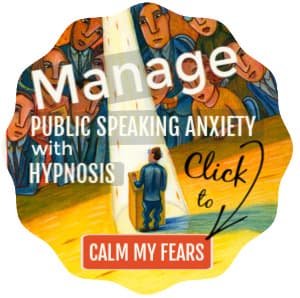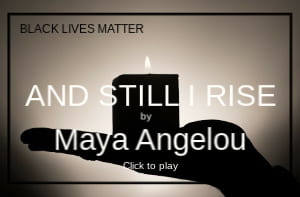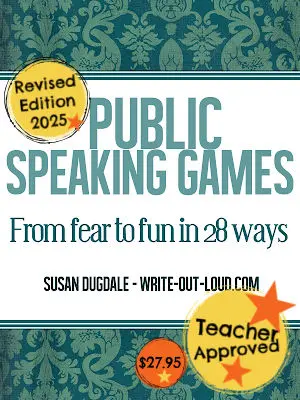- HOME ›
- Speech topics ›
- Table topics - Toastmasters
Table topics & Toastmasters - an overview
Impromptu speaking Toastmaster style, plus 80 themed table topics questions with printables
By: Susan Dugdale | updated Dec. 2025
Table topics is Toastmaster International parlance for all things impromptu speaking. It's the umbrella term they use to refer to the portion of the meeting set aside to focus solely on developing impromptu speaking skills i.e., a table topics session, as well as the topics themselves, the speakers and their speeches.
What's on this page:
- What is a good table topic?
- What makes table topics fun?
- What is the benefit or value of table topics?
- 20 life-lesson suggestions
- 20 music themed table topics ideas
- 20 thought-provoking table topics questions
- Unusual objects or grab bag table topics
- Current event headlines table topics
- The origin of the term 'table topics'
- A brief description of Table Topics - the role of the Table Topics Master, what happens in a session, the ah-counter and the evaluator, feedback and evaluation, what I learned through receiving speech evaluations
- Resources for impromptu speaking - links to 100s more table topic ideas, printable outlines and structural formats for impromptu speeches, 17 fun impromptu speaking activities
- Other resource pages especially for Toastmasters
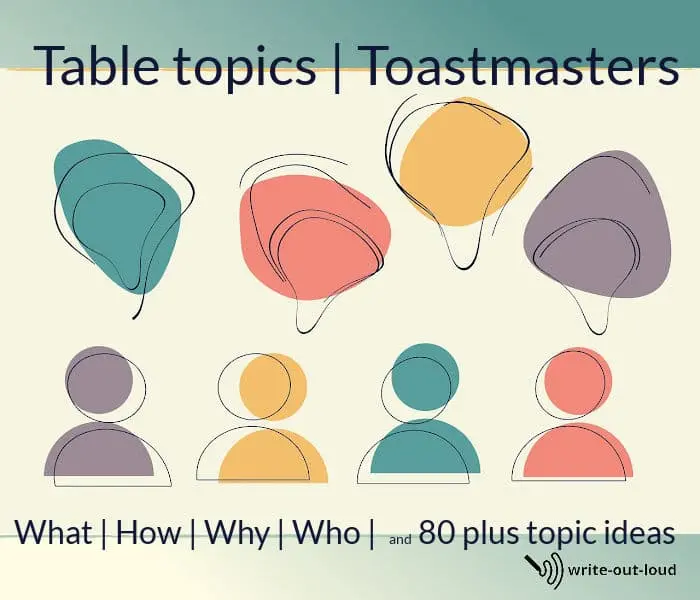
The origin of the term 'table topics'
Before it was adopted by Toastmasters, table topics was the name given to prepared conversation starters: suggestions of things you could easily talk about with family, friends and other guests, over dinner.
The reason behind using them is to bypass the possibility of potentially embarrassing, stilted question and answer exchanges, or worse still, awkward silence.
For instance:
- Do you live locally? No.
- Do you like your job? No.
- Have been here before? No.
The best table topics are open-ended: encouraging free-flowing conversation on non-threatening or polarizing topics.
Examples:
- What's the best thing that happened to you this week?
- What's new in your world?
- When you were growing up, what was your dream job?
A brief description of Table Topics at Toastmasters
The Table Topics Master - prior preparation
The Table Topics session is set up in advance of the club meeting by the person who has been given the role of Table Topics Master*. Ideally, they'll have thought through the session from its set-up to its close.
They'll have checked in with the person chairing the meeting (the Toastmaster of the Day*) to find out:
- who's got what roles e.g., General Evaluator*, Timer*, Grammarian*, Ah-Counter*...,
- who is scheduled to give prepared speeches,
- the theme of the meeting, (if there is one) and,
- if there is a 'word of the day' from the person who has the Grammarian role for the meeting.
(*The people carrying out these roles all have specific tasks to do. To find out more see Toastmasters International -Club Meeting Roles.)
With all that information in hand, they'll prepare a list of topics, and a list of members to call on to speak. (Anybody who hasn't either a prepared speech to give, or a significant role in the running of the meeting, is fair game.)
A typical table topics session
A typical session in the club I belonged to was approximately 20 minutes long: time for 6-8 speakers. It ran fairly predictably, regardless of who was fulfilling the Table Topics Master role, and it was always looked forward to.
To open, the Table Topics Master generally gave a small introductory spiel (talk) about the value/purpose of table topics, and how the session was going to be run. While this was mostly for the benefit of newcomers, or guests, it also served to give the session structure.
They'd explain that they were going to call on a speaker, who would come to the front of the room, and they'd shake hands.
Then the speaker would be given a topic on which they would talk for a minimum time of one minute and a maximum time of two minutes, timed by the Timer.
When they had finished, the Table Topics Master would shake their hand once more and the speaker would return to their seat, amid clapping from an appreciative audience. Then another person would be called up and the process repeated.
If there were guests at the meeting, after they had watched three or four speakers, they were given an opportunity to either briefly introduce themselves or take a topic if they wished to.
After the last speaker, the Table Topics Master, closed the session, thanked the participants, and handed the running of the meeting back to the Toastmaster of the Day.
The Ah-counter and the Evaluator
Other than the Timer and the Table Topics Master, there are often two more people listening intently, and making notes, on what is happening throughout the session. They are the Ah-counter and the Evaluator.
The Ah-counter is listening for repeated filler sounds (ums, ahhs, ers...) words (like, so, yeah, actually, really...), or phrases (you know, I mean, by the way...) and making a tally of them.
During the evaluation part of the meeting, they will be called to report on their findings. E.g.
- Megan: 3 'ums' and 2 'yeah, I dunnos'.
- Bill: 4 'yeah, um, like, well' sequences.
- George: 5 'likes'...
The purpose is not to shame but to highlight habitual speaking patterns that detract from what is being said.
Becoming aware of what we actually say and do, rather than what we think we do, gives us an opportunity to learn to pause, or find other words.
Feedback and evaluation
There's a Toastmasters' joke that if someone moves and speaks during a meeting it will be someone else's job to evaluate how they've done, regardless of whether it's finding the mugs for the half-time coffee/tea break or handing out flyers for the next major Toastmaster hooley (get together). Although that's an exaggeration, receiving an evaluation and giving one is one of the most valuable aspects of belonging to a club. We learn so much from them.
Through feedback we find out if the speech we gave appealed to our audience.
- Was the content appropriate?
- Did the structure work?
- How effective was our body language?
- How well did we use our voice?
- Did we use filler words?
- Did we finish our speech within the allocated target time?
And most importantly, we receive specific suggestions for improvement.
For more see Speech evaluation - giving and getting structures, informed speech feedback. There's a printable example evaluation form to download for your own use.
What I learned through speech evaluations
A thorough evaluation done by an experienced person is gold.
For instance, thanks to receiving speech evaluations, I learned my hands behaved like a pair of frantic flapping birds when I got excited. They danced distractingly: flicking this way and that. They had to be slowed down and given specific gestures to make, ones supporting what I was talking about.
I found out I rolled my eyes skyward while inwardly scrabbling for the next few words to say. Again, disconcerting for the audience.
And there was, sometimes, a lamentable lack of structure. A rave, a tenuously connected string of ideas, however inventive, is not a Table Topics speech. Right. Got it. It took practice, a lot of it, before I became a better speaker.
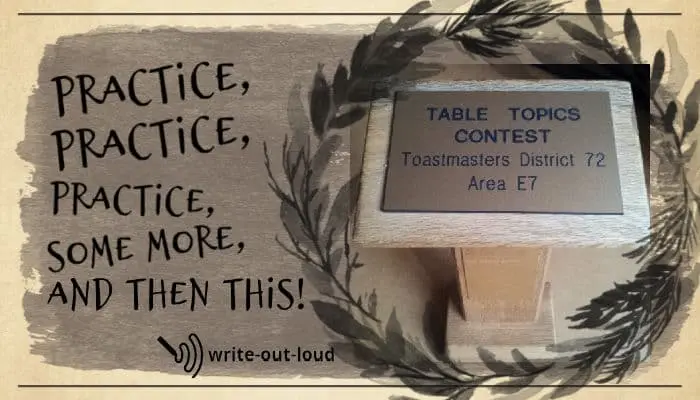
What is a good table topic?
A good Table Topic is one inviting the speaker/respondent to use their imagination. It does not require prior knowledge of the subject to give an effective response, and neither is it a question inviting a simple 'yes' or 'no' answer.
For example, anyone can respond to universally applicable, open-ended questions or topics like these.
- What was the best decision you ever made, and why?
- Who was your hero when you were a child, and why?
- Tell us about a time you felt truly happy.
- What is your favorite season, and why?
They will elicit entirely different speeches depending on who receives them.
Jump to 80+ good table topics questions.
What makes table topics fun?
In my experience, Table Topics is fun when it's run smoothly and lightheartedly by the Table Topics Master, and the topics they've chosen are ones the speakers can relate, and respond, to relatively easily.
Topics requiring specialist or specific knowledge tend to panic inexperienced speakers when they don't have a clue about the subject they've been given. They'll flounder into umming and ahhing.
However, the same topic given to someone who knows what they're doing, will be calmly and neatly sidestepped if they have nothing to say on it.
Nuclear fission and its role in shaping the world
For instance, being asked to talk on 'Nuclear fission and its role in shaping the modern world' would have many people gasping. (What?! Goodness gracious!)

However, someone experienced could change it to a topic they were interested in. Like this:
"Ah, yes, fellow toastmasters, 'nuclear fission and its role in shaping the modern world'. It's a worthy topic, a weighty one."
(The speaker takes a long pause.)
"You know, I've been rehearsing in my mind for a long time what I'd say if I ever was asked to speak on something I had absolutely zero knowledge of. And here it is, at last, - an opportunity not to be passed up, one to grasped and grateful for. Thank you, Table Topics Master!
So, here's the deal. I am going to exchange your topic for something I'm equipped to speak about.
Ladies and gentlemen, dahlias. Yes, flowers, specifically, dahlias. You're going to get approximately one minute on how these glorious autumnal blooms, available in a riot of vibrant colors have shaped my world, for the better."
To make the table topics session fun prepare topics you know the people you're going to give them to can handle. Be kind. Be creative and, be real.
While the ability to sidestep a topic is useful, don't make them unnecessarily tough. The goal is to have people willing and ready to speak.
(It's also handy to have a couple of extra topics in case you suddenly find you have time for more speakers. And if you want to give people specialist topics, match the person you've chosen to speak with a question/topic tailored specifically to target their personal experience and knowledge.)
Go to 80+ table topics questions
What is the benefit or value of Table Topics?
By taking part in Table Topics, Toastmasters' members develop the ability to organize their thoughts quickly under pressure and to respond calmly, and appropriately, to impromptu questions.
And through witnessing a Table Topics session, being in the audience: listening and watching, we learn what works and what doesn't.
At a very practical level the principal benefit is being able to readily take opportunities to speak up either for yourself or on behalf of others who don't have the confidence, skills or experience to speak for themselves.
For instance, a competent impromptu speaker can readily give a good welcome speech, a thank you speech, a toast, or answer questions well in a meeting or at job interviews. They know to make small talk: how to chat easily and thoughtfully to people they're meeting for the first time, and their facilitation skills are good too. These are all highly valued assets in either private or public life.
If you want to extend your career possibilities, participating in Table Topics is a great way to acquire sought after leadership skills. You'll learn to become a better speaker, a better listener, and a better communicator in a safe supportive environment. And it's a lot of fun!
Table topics questions: 80 plus suggestions
Themed ideas for table topic speeches
Before deciding on a set of topics, check with the Toast Master of the Day, on the theme of the meeting. Can you extend that into your questions?
Is there a 'word of the day' to highlight too? Can you work it into your introduction? Can the speakers use it in their speeches? Make that a challenge and ask the Grammarian to keep a tally.
There's a printable to download for each of the four sets of table topics. (Please note they will open on a new page.)
20 Christmas themed table topics + printable
For instance, if the theme is Christmas, here's a collection of 20 topic ideas to fit, with a printable.
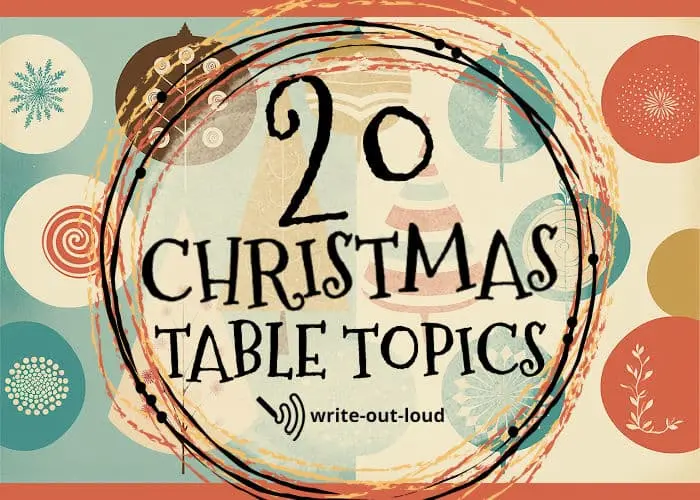
- What secret Santa gift would you give someone close to you, and why?
- What does Christmas mean to you?
- How do we de-commercialize Christmas?
- What is your favorite Christmas song?
- What do you think about re-gifting gifts you don't want?
- If you could kiss anyone under the mistletoe, who would you choose?
- What is the very best gift someone could give you for Christmas?
- If you could give someone you love whatever you wanted, what would that gift be?
- Why do we lie to children about Santa Claus?
- What Christmas traditions do you observe?
- Your much-loved Aunt gives you a truly hideous Christmas sweater. What do you do?
- What do you do when your Christmas spirit is running low?
- Did you ever sneak a peek at a Christmas present before you were supposed to?
- Tell us about your worst Christmas nightmare.
- What is your favorite childhood memory of Christmas?
- How did you learn that Father Christmas (Santa) was a fiction?
- For me, it would not be Christmas without [fill in the blank]?
- Do you shop for Christmas presents or make your own?
- Who is the most difficult person in your family to choose a present for?
- What are you grateful for this Christmas?
Get the printable: 20 Christmas themed table topics.
Table topic ideas - 20 life-lessons
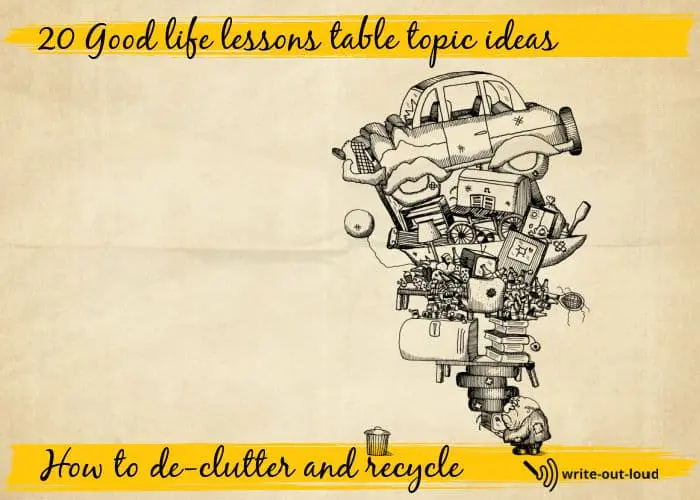
Or if the meeting theme is 'life lessons' the speech topics could be:
- The time I got caught out doing something I knew I shouldn't have been.
- What lessons I have learned the hard way.
- How I solved my procrastination problem
- Why looks can be deceiving
- How what you think about yourself shapes your life
- How to de-clutter and recycle
- Why learning you can't please everyone will save your sanity
- Having money does not solve all problems
- That budgeting works
- Why, when and how to apologize
- That power is intoxicating
- How giving more is the key to getting more
- How to work out what is essential
- That learning to laugh at oneself keeps your ego in check
- That it's the little things in life that count
- That preparation and practice are the keys to success
- That getting older or aging is not an excuse
- Why failure can be an opportunity
- That regret is a waste of time
- That education is never complete
Now get the printable: 20 life-lesson table topics.
20 music themed table topics ideas
And here's some great ideas if the meeting theme is the importance of music:
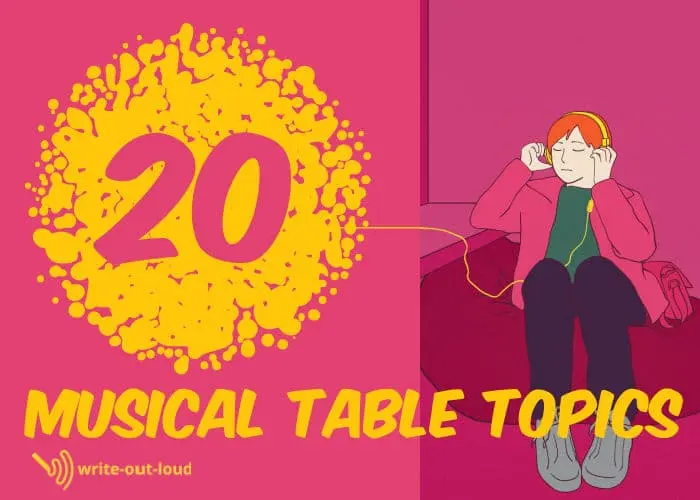
- If you had a theme song, what would it be, and why?
- What is the earliest piece of music you can remember loving listening to?
- How does music unite people?
- What are some of the health benefits of listening to music?
- What piece of music drives you crazy?
- Which musical instrument would you like to play, and why?
- What is your all-time favorite song? Why? What makes it special?
- What is your favorite musical genre? Why?
- What singer or musician do you particularly admire? Why?
- Why do you think some musicians become mega stars?
- What music has special memories for you?
- What music do you listen to while you work?
- What's the first album you bought?
- How does the music played in either lifts, shops or arcades make you feel?
- What music makes you want to dance?
- What sort of music did your parents listen to?
- What's the best concert you've ever been to?
- Why is it important for children to have a musical education?
- What types of music are most popular amongst the people you know?
- What makes music universally appealing?
Download the printable: 20 music themed table topics.
20 thought-provoking table topics questions
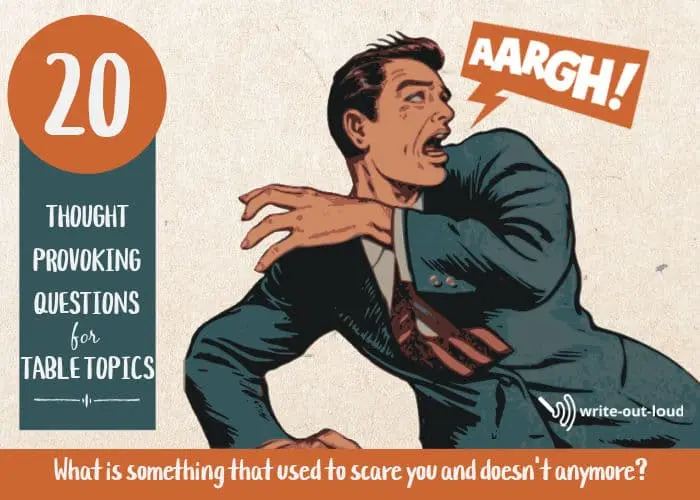
- My most valued possession
- If I had all the time in the world I would...
- If I could only change one thing, I would change...
- What do you find truly beautiful?
- What have you learned about handling your own stress levels?
- Why is it important to do what you're told?
- How will you know when you've 'made it'?
- If you want to find yourself, where is the first place to look?
- If you could wish for a dream to come true, what dream would you wish for?
- What secret have you never shared with anybody until now?
- How do you know money is the root of all evil?
- Would you rather be popular or intelligent?
- What is something that used to scare you and doesn't anymore?
- What do you want to be forgiven for?
- What makes me laugh.
- Is it ever right to do the wrong thing?
- What makes you feel safe and secure?
- When is it a good idea to follow your own path?
- What important lesson does failing teach?
- What does doing the 'right thing' actually mean?
Get the 20 thought provoking questions printable.
OMG - what is it? Unusual object table topics
If your group of potential speakers are experienced*, try taking along a non-see-through bag full of smallish mysterious objects.
Ask each person to reach into the bag and pull out the first object they touch. This is what they'll speak about. You'll get inventive, imaginative story telling on a grand scale - what the object is used for, who it belongs to, its curious back story, its worth on the international market (priceless), ...
When I use this idea, I go around my home looking for items that don't readily reveal what they actually are, how they are used and, that are robust enough to be handled safely. I put one in the bag for each person and a couple of extras to be on the safe side.
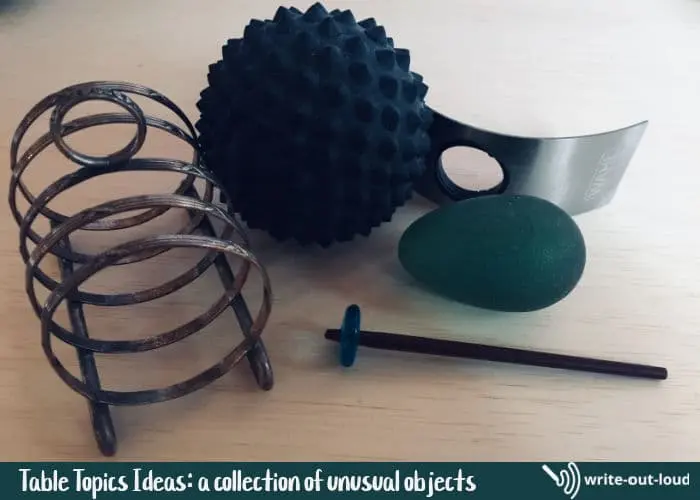
For instance: a small spiky ball made out of some sort of hard black plastic compound, a sharpened, polished wooden stick with a large glass bead glued on one end of it, an old, tarnished silver-plated rack thing with a handle, a piece of curved polished stainless steel, a soft squishy egg made out of green gel, and so on.
*Some topic ideas are more difficult for newcomers than others. Ones asking for highly creative responses might bewilder inexperienced speakers. If in doubt, check with the person if they want to participate before asking them to speak. Once they've seen what others do with topics like these, they're more likely to give it a go themselves sometime in the future.
Current events headlines
Here's another effective easily prepared table topics idea. Take a look at the current events pages of your local papers. What you want is a collection of evocative headlines - one for each speaker and a couple of spares.
Here's some examples from my local newspaper today:
- Police use helicopters, drones in massive raid on cannabis plots in remote bush,
- Cockroaches, pests and filthy kitchens found in nine food outlets,
- Pre-school teacher drove to work drunk but keeps teaching license,
- Can you be too young to get married?,
- Can drinking wine make me a better artist?,
- Boy gets stuck climbing into claw machine for prize at theme park...
Cut your chosen headlines out. Fold them up and put them in a container. Have each speaker select one to use as a starter for their speech. What they say needn't be true! Encourage 'alternative facts': creative, inventive storytelling.
Resources for impromptu speaking (table topics)
If you're looking for more impromptu speaking resources check these out.
- 100+ creative fun ideas for table topics: 11 themed lists - topics based on extraordinary book titles, acronyms, colors, cliches, bumper sticker wisdom and more.
- 150 impromptu speech topics: a highly popular serendipity, (a little bit of everything), selection.
- 150 one-minute speech topic ideas: with example speeches, text and audio, plus a printable speech outline template.
- 40 picture prompts for impromptu speeches: a printable of 40 quality images, and instructions for 5 impromptu speaking/storytelling activities.
- Impromptu speech outlines: 7 structural formats for impromptu speeches, each with a printable outline and an example.
- 196 printable impromptu speech topic cards: 98 proverbs and 98 quotations.
- 17 fun impromptu speech activities to ease people into impromptu speaking without stress. A complete resource. Comprehensive guidelines plus printables. Suitable for middle school upwards.

Other resources especially for Toastmasters
Master your Toastmaster icebreaker: a thorough step by guide, with examples, going from selecting a topic, writing and rehearsing, through to delivery. With an example icebreaker speech.
60 body language speech topics: a selection of topics carefully chosen to encourage expressive use of the body and voice. Any of them would be suitable for any project highlighting body language and/or vocal variety.


